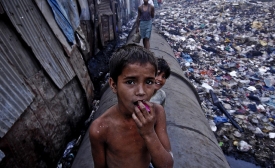Americas
Today’s press conference by President Bush was his last and — by all appearances — his most unscripted. Here was the 43rd President at turns dismissive, angry, jocular, self-deprecating and defensive in describing his eight years in office. What stood out, however, in relation to America’s image, was Bush’s rambling, disputatious monologue when asked about America’s "moral standing:"
Undersecretary of State for Public Diplomacy James Glassman gave a comprehensive overview of his vision for the next phase of United States public diplomacy during his talk in early December at the New America Foundation.
The much maligned Alhurra, the U.S. government's Arabic TV service, is now a "go-to" news channel in Iraq, one of the largest TV markets in the Middle East of more than 28 million population.
The Brookings Institution's report on its proposed USA-World Trust has unleashed a predictable torrent of criticism from the public diplomacy community. To be sure, not all of the commentary has been negative, but much of it has been. The critics are rehashing many of the same tired arguments that have been used to kill any ideas to deal with today's public diplomacy realities.
I am happy to see that Alvin Snyder is contributing again to the CPD Blog. I have always learned from his experience and have found his views to be interesting and provocative. His return commentary, about a revival of Worldnet, accordingly provoked me to add some thoughts about the possibilities for a public diplomacy television service.
It's unfortunate that President Ronald Reagan's global interactive TV Network, Worldnet, no longer exists as it did two decades ago when he stood at Berlin's Brandenburg Gate and dared Soviet leader Gorbachev to "tear down this wall".

In the new movie "Slumdog Millionaire" there is a poignant scene that all public diplomacy experts should have etched in their minds. It's of a classroom full of boys in a Mumbai slum inhabited by Moslems passing around one copy of the "Three Musketeers" as part of their English lesson. Later we watch one of those boys evolve into a gangster. He could just as easily have joined Al Qaeda. The scene takes place in the early 1980's, but I suspect that in spite of India's growth that similar scenes can be found today.







